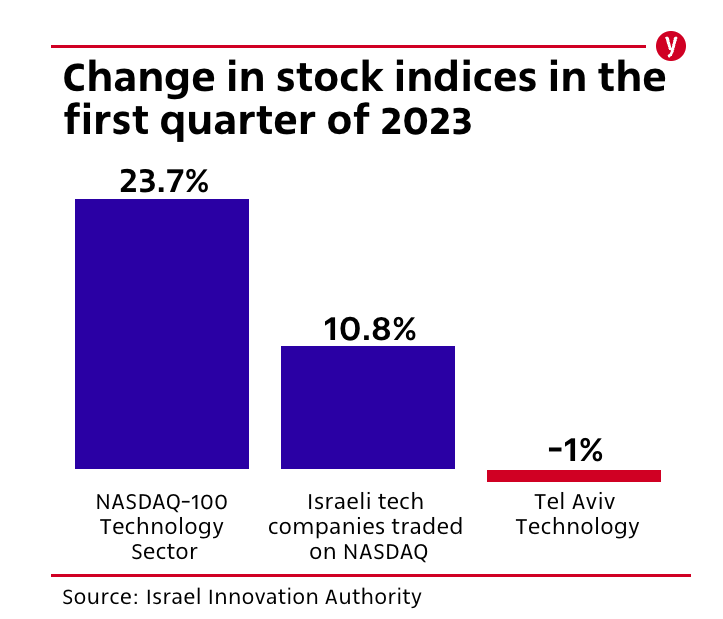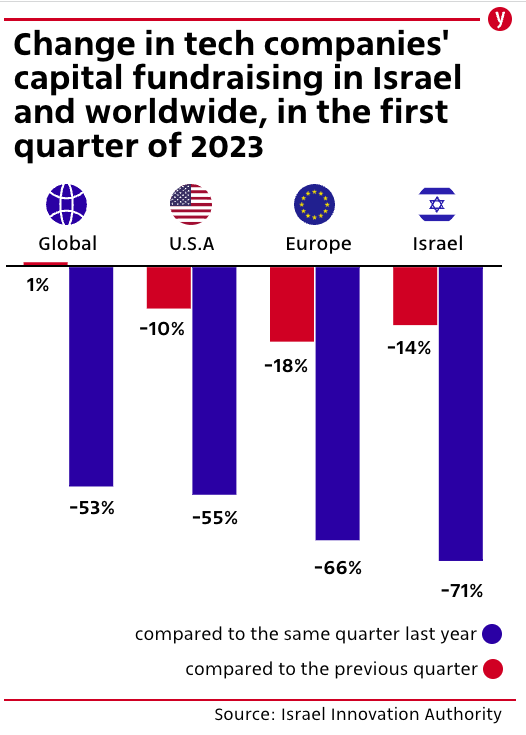. ISRAEL’S TECH SECTOR CRITICAL TO ECONOMIC GROWTH AND PROSPERITY
(קרדיט: ILTV)
Israel's hi-tech companies are performing badly in 2023 after over a decade of growth, the Israel Innovation Authority said in its annual report published on Tuesday. Despite the overall diminished performance of the tech industry globally since the second half of 2022, The report notes that Israeli companies have shown results that were poorer still.
Read more:
Authors of the report cite apprehension over the government's legislative initiatives to change Israel's legal system and the standing of its courts as a co-equal branch, as the source of apprehension that has kept foreign investors away. It also notes that executives in Israeli hi-tech firms warn publically of the risk to the tech industry posed by such legislation.
"The underperformance of the technology companies traded on the Tel Aviv Stock Exchange in the first quarter of the year (January 1-March 30), shows the index of the 100 largest technology companies traded on the NASDAQ rose by 24%. In contrast, the Tel Aviv Technology Index declined during the same period by 1%.4 In other words, while the NASDAQ had already begun its recovery with technology shares on the rise, no such similar trend was recorded in Tel Aviv," the report said.
"A further analysis conducted for the report assessed the performance of the Israeli technology companies traded on the NASDAQ.5 revealed that these companies' shares yielded a return of 10.8% during the first quarter, a higher return than that recorded by the technology companies traded on the TASE but lower than that of the NASDAQ 100 Technology Index. This would seem to indicate that Israeli companies have underperformed since the beginning of the year, with Israeli companies traded in Israel being "punished" by the market with especially low yields. By comparison, from the beginning of 2019 to the end of 2022, the index of Israeli technology companies traded on the NASDAQ rose more than the NASDAQ 100 Index."
Investments in Israel declined by more than 70% compared to the corresponding quarter of the previous year and a sharper decline than that recorded in other markets assessed with which Israel compares itself. In comparison to the previous quarter, "The decline in investments in Israel was more moderate – a decline of 14%. However, this figure is still enough to indicate a sharper decline than that recorded in the US during the same period, the report went on to say.
Noting as a genuine cause for concern that Israeli hi-tech would become detached from global trends, the report shows that following the improved results on NASDAQ since the beginning of the year, expectations were for an increase in investments and employee recruitment in Israel, already in the summer months, but indicators and data for April and May show no such trend.
Israel has the lowest share of government funding for central development and research (R&D) among OECD countries - only 9% of the national R&D expenditure is funded by the government, while 91% of R&D is carried out by the private sector, the Innovation Authority said. According to OECD data, Israel is the only country among the organization's member states where external parties fund more than 50% of R&D conducted in the private sector. In addition, the government cut 100 million NIS from the budget of the Innovation Authority for the coming year as part of the broad economic cuts resulting from the increase in coalition expenses and different priorities set by the government.
Since the beginning of 2023, not only have fewer positions been opened by companies, but the wave of layoffs has also led to a reduction in the number of employees in the industry. In other words, first, new recruitments in the sector were halted, and then downsizing began. In the first quarter of 2023, the number of employees in high-tech positions decreased by 2,250, and in April, it further decreased by approximately 3,400, the report said.
Minister of Innovation Ofir Akunis: "The government will look out for Israeli hi-tech."
"The government will continue to look out for and support Israeli hi-tech. We are in the midst of the legislative process, nearing the completion of preparations for the Encouragement of Capital Investment Law in the Knesset Finance Committee. In the coming weeks, we will announce additional decisions that will support Israeli innovation," Minister of Science and Technology Ofir Akunis said. "I call upon investors from around the world to continue investing in Israeli hi-tech, in science and technology."
"The Israeli economy's dependence on hi-tech has grown significantly over the past decade - so we must do everything necessary to protect the sector and continue nurturing its competitiveness in the global market," Dr. Dror Bin, CEO of the Israel Innovation Authority said.






